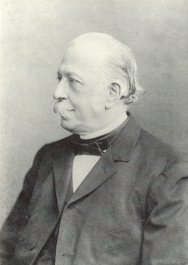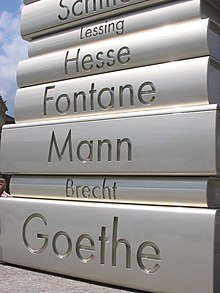Theodor Fontane
Theodor Fontane | |
|---|---|
 | |
| Born | 30 December 1819 |
| Died | 20 September 1898 (aged 78) |
Theodor Fontane (IPA: [ˈtʰeodoɐ̯ fɔnˈtaːnə]; 30 December 1819 – 20 September 1898) was a German novelist and poet, regarded by many to be the most important 19th-century German-language realist writer.
Youth[change | change source]
Fontane was born in Neuruppin into a Huguenot family. At the age of sixteen he became apprentice in a pharmacy and then a pharmacist himself (like his father). In 1839, at the age of 20, wrote his first work (Heinrichs IV. erste Liebe, now lost). His first published work, the novella Geschwisterliebe (or "Sibling Love"), appeared in the Berlin Figaro in December 1839.[1]
His first job as apothecary was in Dresden after which he returned to his father's shop, now in the provincial town of Letschin in the Oderbruch region. In this time Fontane published articles in the Leipzig newspaper Die Eisenbahn (railway) and translated Shakespeare. In 1843, he joined a literary club called Tunnel über der Spree (i.e. Tunnel over the river Spree) in Berlin where he came into contact with many of the most important German writers such as Theodor Storm, Joseph von Eichendorff and Gottfried Keller.
Newspaper writer and critic[change | change source]

In 1844 Fontane enrolled in the Prussian army and set out on the first of many journeys to England. There he learned about old English ballads. Soon afterwards he wrote ballads himself. At that time he became engaged to his future wife, Emilie Rouanet-Kummer, whom he had first met when still at school.
He was - very short - enganged in the revolutionary events of the revolution of 1848. In 1849 he quit his job as an apothecary and became a full-time journalist and writer. In order to support his family he took a job as a writer for the Prussian intelligence agency Centralstelle für Preßangelegenheiten which was meant to influence the press towards a German national cause. Again he specialised in British affairs, and the agency sent him as correspondent to London for a couple of years. His wife and two sons followed him there. While still in London he quit his government job and, on his return to Berlin, became editor of the conservative Kreuzzeitung (newspaper).
London[change | change source]
His books about Britain include Ein Sommer in London (1854); Aus England, Studien und Briefe (1860) and Jenseits des Tweed, Bilder und Briefe aus Schottland (1860). At the period, and following the fashion of Walter Scott, traditional British stories were still en vogue on the continent. His Gedichte (1851) and ballads Männer und Helden (1860) tell of Britain's glories in days gone by.
Back in Germany, Fontane became particularly interested in the Mark Brandenburg region. He was especially proud of its past achievements and delighted in the growth of its capital city, Berlin. His fascination with the countryside surrounding Berlin may be seen in his delightfully picturesque Wanderungen durch die Mark Brandenburg (1862-1882, 5 vols.).
Prussian War[change | change source]
In 1870, he quit his job at the Kreuzzeitung and became theater critic for the liberal Vossische Zeitung (newspaper). This job he kept until retirement. He had already written about Prussia's war against Denmark and the Austro-Prussian War. Then he went to write about the Franco-Prussian War in 1870 and was taken prisoner. He remained in French captivity for three months. His experiences there are set down in Kriegsgefangen Erlebtes 1870 (1871); subsequently he published his observations on the campaign in Der Krieg gegen Frankreich 1870-71 (1874-1876).
Later years[change | change source]
At the ripe age of 57 Fontane finally took to what he would be remembered for, the novel. His fine historical novel Vor dem Sturm (1878) was followed by a series of novels of modern life, notably L'Adultera (1882), a book about adultery which was considered so risqué that it took Fontane two years to find a publisher. In his novels Frau Jenny Treibel, Irrungen, Wirrungen, and Effi Briest (1894), he found his very own tone, he wrote about insights into the lives of the nobility as well as the "common man"; his achievement there was later described as poetic realism. In Der Stechlin (1899), his last finished novel, Fontane adapted the realistic methods and social criticism of contemporary French fiction to the conditions of Prussian life.
Works[change | change source]
- Geschwisterliebe, 1839
- Zwei Post-Stationen, 1845
- James Monmouth, 1854
- Tuch und Locke, 1854
- Goldene Hochzeit, 1854
- Vor dem Sturm, 1878
- Grete Minde, 1880
- Wanderungen durch die Mark Brandenburg, 1880
- Elternklipp, 1881
- L'Adultera, 1882
- Schach von Wuthenow, 1882
- Graf Petöfy, 1884
- Unterm Birnbaum, 1885
- Cécile, 1887
- Irrungen, Wirrungen, 1888
- Stine, 1890
- Quitt, 1891
- Unwiederbringlich, 1891
- Frau Jenny Treibel, 1892
- Meine Kinderjahre, 1894
- Effi Briest, 1896
- Die Poggenpuhls, 1896
- Der Stechlin, 1899
- Mathilde Möhring, 1906
Poems[change | change source]
- Archibald Douglas
- Die Brück' am Tay
- John Maynard
- Herr von Ribbeck auf Ribbeck im Havelland
- Aber es bleibt auf dem alten Fleck
- Ausgang
- Gorm Grymme
References[change | change source]
- ↑ His biographer Gordon A. Craig in Theodor Fontane: Literature and History in the Bismarck Reich (Oxford University Press, 1999) observes that this work gave few indications of his promise as a gifted writer: "Although the theme of incest, which was to occupy Fontane on later occasions, is touched upon here, the mawkishness of the tale... is equaled by the lameness of its plot and the inertness of the style in which it is told, and [the characters] Clärchen and her brother are both so colorless that no one could have guessed that their creator had a future as a writer."
- Craig, Gordon Theodor Fontane : Literature and History in the Bismarck Reich, New York : Oxford University Press, 1999 ISBN 0-19-512837-0.
See Thomas Mann's 1910 essay, "The Old Fontane," in Essays of Three Decades (Knopf, 1947). Very fine.
Other websites[change | change source]
- (in English) Trials and Tribulations, one of Fontane's works
- (in German) Works by Theodor Fontane at Project Gutenberg
- (in German) Works by Theodor Fontane at Zeno.org
- Collection of links Archived 2008-04-16 at the Wayback Machine
- This article includes material adapted from (in German) Fontane's biography Archived 2007-10-12 at the Wayback Machine
